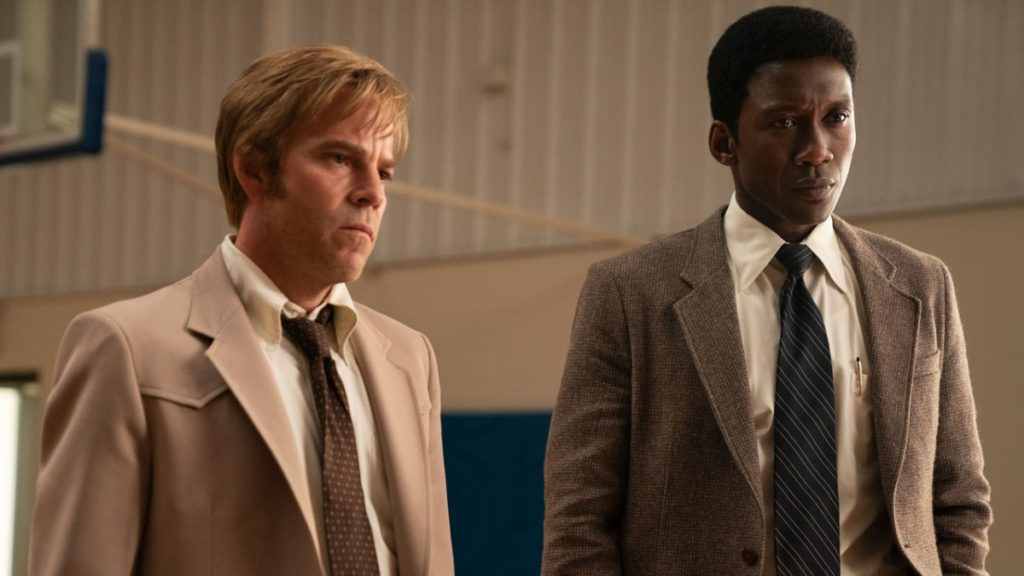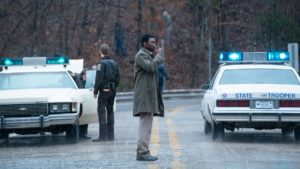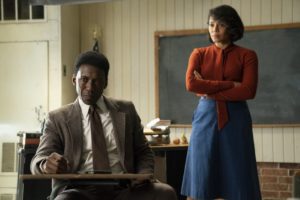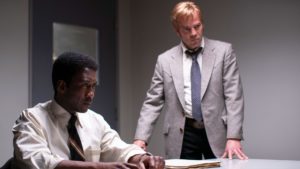Het eerste seizoen van True Detective uit 2014 was een enorm succes. Een Southern moordmysterie met een occult tintje. Naast de ‘wie heeft het gedaan’ verhaallijn gaat het seizoen vooral ook over de gecompliceerde karakters van Martin Hart en Rust Cole (overtuigend gespeeld door Woody Harrelson en Matthew McConaughey). Er was een rauwe en voelbare chemie tussen de twee. De serie was een mix van symbolisme, psychologie en seriemoord waar de kijker zich op kon uitleven. Dit resulteerde in complete theorieën over wie uiteindelijk de ‘Yellow King’ was. Halsreikend werd er daarom uitgekeken naar het tweede seizoen. Dit bleek een flop. Een drama, en niet in de goede zin van het woord. Nu, vijf jaar na het eerst seizoen, probeert HBO met een derde serie het succes van 2014 te evenaren en de kijker het tweede seizoen te laten vergeten.
Ziggo zendt True Detective seizoen 3 uit vanaf 14 januari, maar ik kreeg de kans om de eerste vijf afleveringen te bekijken.
Onderlinge chemie: check
Hoewel het niveau van het eerste seizoen niet wordt gehaald, is serie drie zeker de moeite waard om te kijken. Dit mede dankzij Oscarwinnaar Mahershala Ali, die Wayne Hays speelt. Een stille, donkere rechercheur met een Vietnamverleden die zich bewust is van zijn huidskleur in het blanke Amerikaanse zuiden. Daarnaast doet Stephen Dorff’s vertolking van de stoere, maar sociale rechercheur Roland West mij afvragen waar de acteur al die jaren is geweest. De ‘kalme’ chemie tussen Ali en Dorff’s Hays en West is er een van respect en begrip. Dieper dan een gewone vriendschap.

Het derde seizoen volgt Hays tijdens drie verschillende tijdsvakken: in 1980 waarin hij met zijn partner Roland West de vermissing van twee kinderen onderzoekt, in 1990 wanneer de zaak weer in de aandacht komt als men de bestaande veroordeling ongedaan wil maken, en in 2015, wanneer Hays wordt geïnterviewd voor/door een crime show a la The Real Story with... en How to Make a Murderer.
Tijd is vloeibaar en buigbaar, net als de geest van Hays. De grenzen tussen de herinneringen en periodes overlappen. “You ever been to some place you couldn’t leave, you couldn’t stay? At the same time?” Het ene moment bestudeert Hays in 1980 de reflectie van de ‘Harvest Moon’ in een plas water, daarna verandert datzelfde maanlicht in een studiolamp die de staf van de show in 2015 gebruikt. De schakeling tussen de tijden stoort niet, het draagt bij aan de symboliek van de show. Daarnaast speelt Ali de door Alzheimer getergde Hays perfect. Boos. Verward. Zoekend.
Mysterieuze verdwijning en chagrijnige rechercheurs: check
Wat betreft de setting zit het met derde seizoen wel goed; vermiste kinderen in het Amerikaanse zuiden van de jaren tachtig. In het hart van de Ozarks, Arkansas. Een arm gebied met allerlei onderliggende spanningen. De rechercheurs lijken een reflectie te zijn van het landschap: somber, chagrijnig en uitgeblust. In een typische jaren tachtig weerspiegeling van de Amerikaanse way of life bij de politie, intimideren Hays en West verdachten; indien nodig met fysiek geweld. Om verveling tegen te gaan schieten ze op ratten.

Aan deze verveling komt een einde wanneer Hays en West de verdwijning van de Purcell-kinderen moeten onderzoeken. Will en Julie Purcell stappen ’s middags op hun fiets om nooit weer terug naar huis te komen. Het blik met standaardverdachten wordt opengetrokken: vervelende tienerjongens uit de buurt die T-shirts met satanische prints dragen, de gekwelde inheemse Vietnam veteraan ‘Trash Bin’ en de vreemdgaande en/of alcoholische ‘white trash’ ouders. De kijker wordt constant uitgedaagd en op het verkeerde been gezet met elke nieuwe onthulling of hint: oude Playboys en een kijkgaatje in de slaapkamer, griezelige ritualistische poppen en mysterieuze afspraken op een geheime plek in de bossen.
Seksisme: check.
“I’m a feminist. If they want to sell me a piece of ass, they got the right,” aldus rechercheur West. Waar True Detective in het verleden seksisme vooral overduidelijk visueel presenteerde, is het nu enigszins subtieler. De twee vrouwen die centraal staan in True Detective: Amelia Reardon (Carmen Ejogo) en Lucy Purcell (Mamie Gummer), verschillen hemelsbreed van elkaar. Behalve in het feit dat ze zich beperkt voelen in de rol die ze ‘gedwongen’ zijn te leven. Lucy, de moeder van Will en Julie, laat haar kinderen in de steek door haar tijd door te brengen met drank en vreemdgaan: “I’ve got the soul of a whore.” Uiteraard wordt dit gedrag bestraft.

Amelia, een lerares en de latere vrouw van Wayne Hays, heeft ambities om schrijfster te worden. Ze wil meer zijn dan alleen echtgenote en moeder. In Hays heeft Amelia de ideale bron van informatie over de Purcellzaak en zij maakt hier dan ook gebruik van. Gedurende de show wordt ze neergezet als een vrouw die genadeloos mensen en situaties gebruikt voor het inwinnen van informatie over de zaak. Zelfs haar man. Hays laat haar weten dat hij niet blij is met haar ambities en weigert haar boek te lezen. Hij roept haar publiekelijk tot de orde en probeert haar tegen te werken in haar onderzoek. Lucy en Amelia zijn enigszins tweedimensionaal.
Racisme: check
Racisme in het zuiden van de VS tijdens de tachtiger jaren: het kon niet uitblijven in de serie. Het manifesteert zich van ‘subtiele’ blikken naar Hays en het negeren van zijn theorieën, tot het regelrecht gebruiken van scheldwoorden en bedreigingen. Het onderwerp wordt dan ook vaak erkend door de diverse personages, vooral West kaart het vaak aan. Hays zegt dat hij in het bezit is van een ‘redneck radar’ en West benoemt of bespot een ander heet hangijzer: affirmative action. Als Hays zijn kaarten beter had gespeeld, zou hij hoger in rang zijn geëindigd dan West.

Black Lives Matter. Het feit dat blanke politieagenten vaker donkere ‘verdachten’ neerschieten, wordt ook sterk verbeeld. Dit gebeurt in een scene waarin Hays en West een trailerpark bezoeken met alleen maar Afro-Amerikaanse inwoners. Men noemt Hays een ‘Uncle Tom’ en de ‘verdachte’ hitst de boel op door te beweren dat de blanke politie hem er in wil luizen en neer wil schieten. Escalatie dreigt.
Hoewel het mysterie enigszins traag van de grond komt, zorgt elke aflevering er wel voor dat je meer wilt zien. Niet alleen hoe het afloopt met de kinderen, maar de ontwikkeling van de relatie tussen Hays en West en het liefdesverhaal tussen Hays en Amelia zijn interessante verhaallijnen. Dit mede dankzij de chemie tussen de acteurs en actrice. Daarnaast is de cinematografie van True Detective wederom indrukwekkend.
Ziggo Movies & Series zendt True Detective seizoen 3 uit vanaf 14 januari 2019.
Photos: copyright Warrick Page/HBO
https://www.youtube.com/watch?v=RZP6t1FmVO8
